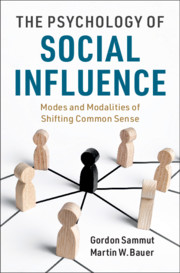Book contents
- The Psychology of Social Influence
- The Psychology of Social Influence
- Copyright page
- Dedication
- Contents
- Figures
- Tables
- Boxes
- Foreword 1
- Foreword 2
- Acknowledgements
- Chapter 1 Modalities of Social Influence
- Part I Recurrent Sources of Populism
- Part II Experimental Paradigms
- Chapter 4 Norming and Framing
- Chapter 5 Conforming and Converting
- Chapter 6 Obeying
- Chapter 7 Persuading and Convincing
- Part III Necessary Extensions
- Part IV Theoretical Integration
- References
- Index
Chapter 6 - Obeying
Authority and Compliance
from Part II - Experimental Paradigms
Published online by Cambridge University Press: 19 December 2020
- The Psychology of Social Influence
- The Psychology of Social Influence
- Copyright page
- Dedication
- Contents
- Figures
- Tables
- Boxes
- Foreword 1
- Foreword 2
- Acknowledgements
- Chapter 1 Modalities of Social Influence
- Part I Recurrent Sources of Populism
- Part II Experimental Paradigms
- Chapter 4 Norming and Framing
- Chapter 5 Conforming and Converting
- Chapter 6 Obeying
- Chapter 7 Persuading and Convincing
- Part III Necessary Extensions
- Part IV Theoretical Integration
- References
- Index
Summary
Chapter 6 considers the most controversial topics in the study of social influence, obedience to authority. The chapter reviews empirical findings concerning obedience in children. These demonstrate how children adopt a complex cognitive assessment of obedience in everyday life. This is countered by what are seemingly more rudimentary processes demonstrated by adults in one of psychology’s best known experiments: Milgram’s obedience demonstrations. The chapter goes on to examine the social identity account of obedience following a review of the Utrecht studies. The latter replicated Milgram’s installation in an ecologically more valid set-up using mediated expression of violence. The chapter concludes by arguing that the obedience response to authority is primarily 'natural' and necessary for human sociality; it enables communities to thrive by working towards the realisation of common goods through unquestioned acceptance of authority by consent. Only secondarily, obedience processes can morph into dysfunctional 'authoritarianism' that thwarts human potential.
Keywords
- Type
- Chapter
- Information
- The Psychology of Social InfluenceModes and Modalities of Shifting Common Sense, pp. 117 - 136Publisher: Cambridge University PressPrint publication year: 2021

